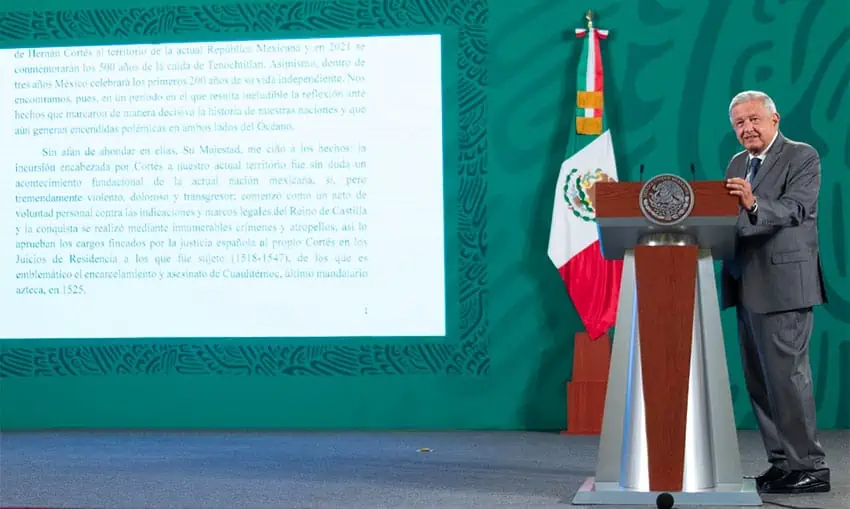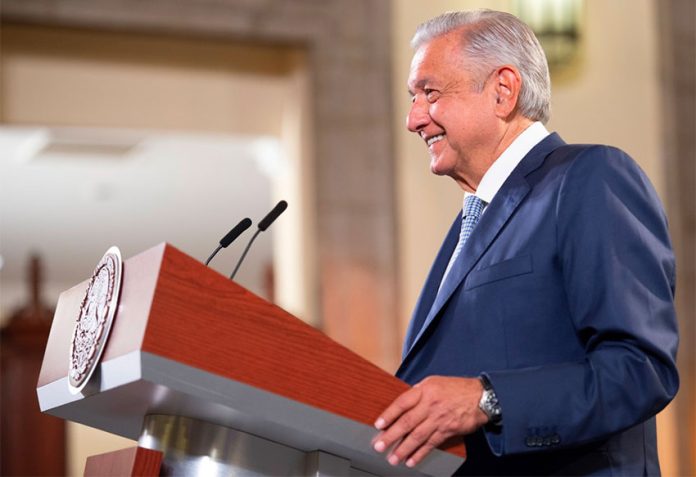A political animal, President López Obrador has represented three different political parties in his 46-year career. He joined the Institutional Revolutionary Party (PRI) in 1976, when Mexico was a one party state.
In 1989, he joined the Party of the Democratic Revolution (PRD), and became mayor of Mexico City in 2000 under its name. In 2014, he founded the National Regeneration Movement (Morena), which delivered him to high office in 2018.
Here’s a rundown of what AMLO, as the president is commonly known, has discussed in his morning conferences this week.
Monday
The president was feeling at home on Monday. The conference was broadcast from Tabasco, his home state, the culmination of a weekend whistle stop tour of the southeast to evaluate the progress of the Maya Train.
“We are really delighted to be here, on home ground … here there is more sun, more clarity: this is the tropics,” the president said, doing his bit for the local tourist board.
When the floor opened, Cuba came first. The way to resolve protests on the island was to end the U.S. trade embargo, the president said. “The truth is that if [the international community] really wanted to help Cuba, the first thing to do is suspend the blockade … as the majority of the world’s countries are demanding … That would be a truly humanitarian gesture.”
“No country in the world should be surrounded, blocked: that is absolutely contrary to human rights. You cannot create a fence and isolate an entire people for political reasons,” he added.
The next topic raised the tropical heat: since the president’s administration began, 56 activists had been killed.
“It’s more propaganda from our adversaries disseminated by Reforma,” AMLO said, lambasting his least favorite newspaper.
“Is it an attack to count the number of activists who have been murdered?” the journalist responded.

And then, breakfast. The president listed the Tabascan delights that had made the menu: “chanchamito … tostones, torrejas, chipilín tamales.”
Tuesday
An update on the the third wave of the pandemic kicked off Tuesday’s mañanera. The deputy health minister explained that while the third wave had taken a similar shape to the previous two, hospitalizations and deaths were down around 75% thanks to the vaccination drive.
Back to political matters, a journalist announced that Foreign Minister Marcelo Ebrard had stated his ambition to run for the presidency. There were no backroom dealings involved, AMLO replied.
The unsold presidential plane returned to the forum. An English company had contacted a journalist to ask if the plane had to be sold outright, or whether it could be used for a “super VIP” per ticket service, allowing the grounded jet to take to skies once more.
The president saw an apt opportunity to deride his predecessor’s imprudence. “I fly [to different parts of the country] every weekend … we probably spend about 50,000 pesos return … per year 6 million pesos … In the last trip made by president Peña Nieto … 7 million pesos were spent just on the internet service,” the left-wing leader asserted.
Wednesday
AMLO had evidently drunk his morning coffee on Wednesday. The mañanera started with a long solo effort, which addressed a range of themes at a canter: media bias, humanism, neoliberal corruption and the new Mexican middle class.
When the fake news patrol rolled up, Ana Elizabeth García Vilchis offered an assurance to journalists in the room: “We insist that here no journalists or media organizations are stigmatized.”
Two “lies” were addressed. The first related to an investigation into the Sowing Life forestation project; the second to reporting on the government’s importation of Birmex, an anesthetic for Covid-19 patients.
Later, an unwelcome relative came knocking: Spain. Earlier in his term, the president had written to the King of Spain and the Pope to demand an apology for historic wrongdoing in the conquest, which the government of Spain then “vigorously” rejected.
A dual nationality journalist tried to mediate the dispute, and suggested that apologies were not an appropriate demand.

“The Spanish were invaded by Muslim countries and they brought knowledge, they brought mathematics … The same goes for the Roman Empire when it invaded Spain … we didn’t ask them to apologize, rather we thanked them for it.”
The president, however, had been made to feel slighted. “I sent a letter … in a very respectful way, and they didn’t even have the manners to respond,” he said, and preceded to read the 1,000-word letter.
But the dispute was not purely historical, he conceded. “They abused us in the neoliberal period and committed acts of corruption on the part of Spanish companies, they saw us as a place of conquest and dedicated themselves to stealing.”
Thursday
Guerrero, one of Mexico’s most historically violent states, was back on the agenda Thursday. It was to be the president’s weekend destination.
“What is the strategy for Guerrero, where 19 paramilitary groups are serving 18 criminal organizations,” posed a journalist.
“The violence in Guerrero originates in a large measure from abandonment of the communities there … the best way to confront the violence is to create opportunities, work, well being,” the president replied, pointing to the government’s success in providing fertilizers to farmers, which has helped lower malnutrition, and the Sowing Life project which had created alternatives to growing illicit crops.
“I maintain my philosophy, that human beings are not bad by nature, it is the circumstances that take some down an antisocial road,” AMLO added, exhibiting his Rousseauian world view.
Before finishing, he set himself a weighty challenge with regard to security. “If we don’t manage to pacify Mexico … we are not going to be able to call our government a success,” he said.
Friday
Security spilled over into the final mañanera. This time it was Guanajuato, the most violent state in the country.
An investigative journalist gave his perspective: “We have found constant … complicity … between officials who have been in for a long time, between politicians and an attorney general who has been in office for 12 years … we have been spied on … we are at risk, president,” he said.
AMLO agreed it was time for change. “Guanajuato is one of the states with the most violence and for quite some time … If he [the attorney general] were the manager of a company, with those results he would have been fired,” he affirmed.
Before the president could head for Guerrero, there was a disgruntled journalist to negotiate with. The man in question had written up an investigation into the Sowing Life project, which had been denounced by the fake news patrol two days earlier.
“Last Wednesday … with absolute lack of rigor and evident disregard for the truth, a text of my authorship was alluded to and entitled ‘False data from Sowing Life’ … it was branded as misleading. The ‘who’s who of lies,’ president, … is destined to be useless and tendentious if there is no trained person behind it,” the reporter seethed.
The Tabascan opted for hugs, not bullets. “Criticism is fundamental, it is basic, it helps us purify public life.” And then, a humble admission: “What is said here [in the mañaneras] is not the absolute, irrefutable truth,” he said, shortly before striding away to attend to the nation.
Mexico News Daily
